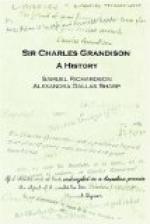The dear prater went on—My guardian called me aside, when tea was over. My Emily, said he, [I do love he should call me his Emily!—But all the world is his Emily, I think,] Let me see what you will do with these two notes; giving me two bank-notes of 25L. each.—Present pin-money and cash may be wanted. We will suppose that your mother has been married a quarter of a year. Her pin-money and the additional annuity may commence from the 25th of December last. Let me, Emily, when they go away, see the graceful manner in which you will dispose of the notes: and from Mr. O’Hara’s behaviour upon it, we shall observe whether he is a man with whom your mother, if it be not her own fault, (now you have made it their interest to be kind to each other,) may live well: but the motion be all your own.
How good this was! I could have kissed the hand that gave me the notes, if I thought it would not have looked too free.
I understand you, sir, said I.
And when they went away, pouring out their very hearts in grateful joy, I addressed myself to Mr. O’Hara. Sir, said I, it is proper that the payment of the additional annuity should have a commencement. Let it be from Christmas last. Accept of the first payment from my own hands—And I gave him one 25L. note: and looking at my mother, with a look of duty, for fear be should mistake, and discredit himself in the eyes of the deepest discerner in the world, gave him the other.
He looked upon first one, then upon the other note with surprise—And then bowing to the ground to me, and to my guardian, he stept to my mother, and presented them both to her. You, madam, said he, must speak: I cannot as I ought: God send me with a whole heart out of this house! He hurried out, and when he was in the hall, wiped his eyes, and sobbed like a child, as one of the servants told my Anne.
My mother looked upon one note as her husband had done, and upon the other; and, lifting up her eyes, embraced me—And would have said something to my guardian, but he prevented her, by saying—Emily will be always dutiful to you, madam, and respectful to Mr. O’Hara: may you be happy together!
And he led her out—Was ever such a condescension! He led her out to her husband, who, being a little recovered, was just about to give some money to the servant, who was retiring from the offer.—Nobody, said my guardian, graciously smiling, pays my servants but myself, Mr. O’Hara. They are good people, and merit my favour.
And he went to the very door with my mother. I could not. I ran back, crying for joy, into the drawing-room, when they went out of it. I could not bear myself. How could I, you know, madam?—Captain Salmonet all the time wiped his eyes, shrugged his shoulders, lifted up his hands, and cried out upon Jesu; and once or twice he crossed himself: but all the time my guardian looked and acted, as if those actions and praises were nothing to be proud of.




